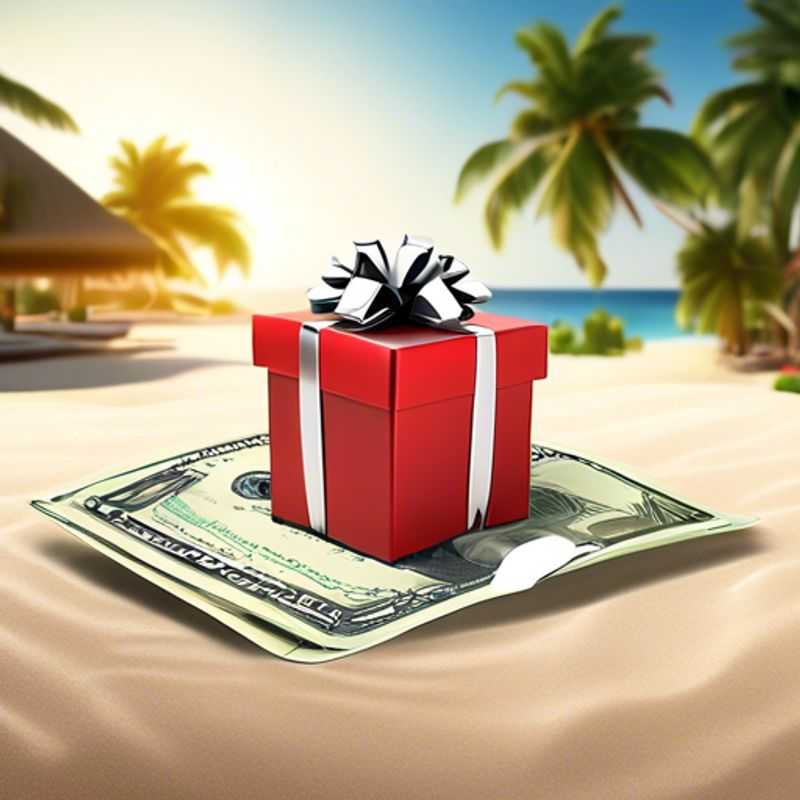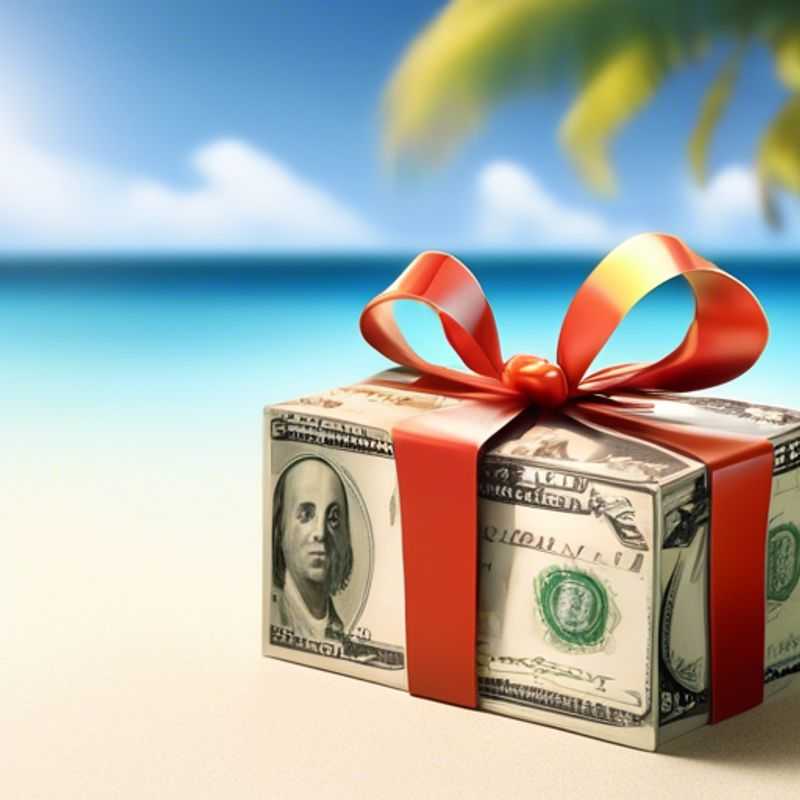7 Tips to Know About How to Find 1 Dollar Gifts (Without Getting Scammed!)

7 Tips to Find Real Deals on $1 Gifts: A Bargain Hunter's Guide
Alright, friends, let's talk about the thrill of the hunt! Finding a dollar gift is like uncovering a hidden treasure. It's about the journey, the story, the unexpected joy. But let's be real, we all need a little guidance when we're navigating the world of bargain hunting. So, here are seven tips to make your dollar gift hunt a smooth and rewarding adventure:
First, always research the seller's reputation and reviews before you buy.

Researching Seller Reputation: Your Key to Smart Shopping
Listen up, savvy shoppers! Before you click that "buy" button, do yourself a favor and check out the seller's reputation. It's like getting a sneak peek behind the curtain before taking the plunge.
Think of it this way: You wouldn't jump into a pool without checking if the water is clear, right? The same principle applies to online shopping.
Here's where the magic happens: seller reviews. These are like digital word-of-mouth, giving you insights from other customers who've walked the same path. Look for patterns and pay attention to both the positive and negative feedback.
But wait, there's more! You can also check out the seller's rating on platforms like eBay or Amazon. It's like a report card, reflecting their performance over time. Pay attention to those stars!
And let's not forget independent review sites. These guys go the extra mile, offering expert opinions and unbiased assessments.
Remember, a little investigation goes a long way! It's about finding sellers who have a track record of reliability and customer satisfaction. So, take a moment, do your research, and enjoy the peace of mind that comes with knowing you're making a smart choice.

Credit Card Protection: Your Shield Against Shopping Scams
Alright, friends, let's talk about credit cards and fraud protection. You've heard it before, but let's dive a little deeper. Using a credit card for purchases can be a real lifesaver when it comes to fraud. Why? Because credit card companies have your back, especially in the unfortunate event of unauthorized charges.
Think about it this way - if someone gets hold of your debit card, they can drain your bank account in an instant. With a credit card, you have a buffer. If you report a fraudulent charge, you're not out the money immediately. You're covered by what's called "zero liability" which means you don't have to pay for unauthorized charges.
Now, there are a few things to remember. First, always keep your credit card information safe, just like you would your debit card. Second, check your statements regularly, both online and in the mail. Be on the lookout for any suspicious transactions. Lastly, if you spot a fraudulent charge, report it to your credit card company immediately. The quicker you act, the better.

Don't Get Caught Off Guard: Unmasking Hidden Fees and Shipping Costs
You’re all set to buy that amazing item, but hold on! Don't let hidden fees or shipping costs sneak up on you. It's easy to get caught up in the excitement of a great deal, but always check for any extra charges before you hit that "buy now" button.
Think about it: what might be hiding in the fine print? It could be a processing fee, a restocking fee, or even extra shipping charges for specific areas or express delivery.
Here's the trick: look for a breakdown of costs, especially when you're in the checkout process. See if they've listed everything clearly, including shipping fees. Sometimes they'll even give you a free shipping option if you spend a certain amount.
Don't be shy! Contact customer service if you have any questions about fees or shipping. They're there to help you understand the whole picture before you make your purchase. After all, the best deals are the ones that don't come with a surprise at the end!

Beyond the Hype: Spotting Genuine Products with Official Seals and Certifications
Looking for official seals or certifications from reputable organizations is a smart way to ensure the quality and authenticity of a product. These seals act as a trusted third-party endorsement, offering consumers assurance about safety, performance, and ethical practices.
Here's a quick look at what you should know:
What are Seals and Certifications?
Seals and certifications are symbols or labels awarded to products that meet specific standards or criteria set by independent organizations. They are often based on rigorous testing, audits, and evaluations.
Why are they important?
They provide a level of confidence for consumers. Think of them as a shortcut to researching the quality and safety of a product. For example, a seal for energy efficiency can help you save money on your electricity bill, or a certification for organic food can ensure that you're consuming food free from certain pesticides and chemicals.
Where to find them?
Look for seals and certifications on product packaging, labels, websites, and sometimes even on product brochures.
How to choose reputable organizations?
Research organizations to ensure they are independent and have a solid reputation for rigorous standards. Many certifications come with a fee, so be aware of any potential costs associated with them. Always trust your gut instinct, and if something seems fishy, it probably is.
Remember, seals and certifications are just one piece of the puzzle when making informed purchasing decisions. Do your research, compare different products, and read reviews to make the best choice for your needs.

Don't Click That! How to Spot and Avoid Suspicious Links & Pop-Ups
Listen up, shoppers! You know me, always on the hunt for the best deals, exploring hidden corners of the world for treasures. But even the most adventurous shopper needs to be smart about online safety. Think before you click!
Those suspicious links and pop-ups, the ones promising "free stuff" or "exclusive deals," can be a trap. Clicking on them can lead you to websites loaded with malware, which can steal your personal information or even damage your computer.
Here's the deal: Always double-check the URL. If it looks weird or misspelled, don't click. Hover your mouse over the link before clicking to see where it really goes. If you're unsure, don't click!
Remember, online safety isn't just about protecting your credit card. It's about safeguarding your entire online experience. Be smart, be safe, and keep shopping!

HTTPS: Your Shield Against Online Thieves (and Why It Matters)
Hey there, savvy shoppers! You know how much I love discovering hidden gems, whether it's a bustling market in a far-off land or a quirky local shop right around the corner. But when we're talking about online shopping, there's one thing that's even more crucial than finding the perfect deal: security.
Here's the lowdown: Before you even think about entering your credit card details or personal information on any website, make sure it's using a secure connection. You'll know this by looking for "HTTPS" in the website address bar – that "S" is for secure! It means your information is being encrypted, like a secret code, making it super hard for anyone else to snoop.
And trust me, you don't want to be the one who learns the hard way about the dangers of shopping on an unsecured website. Think of it this way: you wouldn't leave your wallet on a park bench, right? So why would you trust your online details to a website that doesn't have a secure connection? It's just not worth the risk!

If It Seems Too Good to Be True, It Probably Is: Spotting Online Shopping Scams
In the thrilling world of online shopping, where deals shimmer like desert mirages, it's easy to get swept away by the allure of something too good to be true. But hold your horses, dear shopper! Just as a seasoned explorer knows to be wary of shimmering waters in the desert, we must be cautious of online bargains that seem suspiciously perfect. These deals might be cleverly disguised scams, waiting to snatch your hard-earned money.
Think about it, a brand-new smartphone at a fraction of the price? A luxury handbag for a song? The whispers of "too good to be true" should be a red flag, urging you to investigate further. These tempting offers might lead you to a fake website, designed to steal your personal information or financial details.
So, how can you navigate the treacherous waters of online shopping and avoid getting snared by scams? Here's a simple rule of thumb: If it sounds too good to be true, it probably is. Always double-check the website, look for reviews from other buyers, and be cautious of unfamiliar sellers or websites. Remember, your shopping journey should be an exciting adventure, not a trap.
